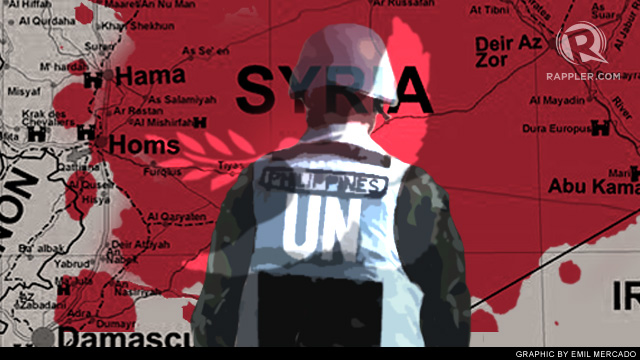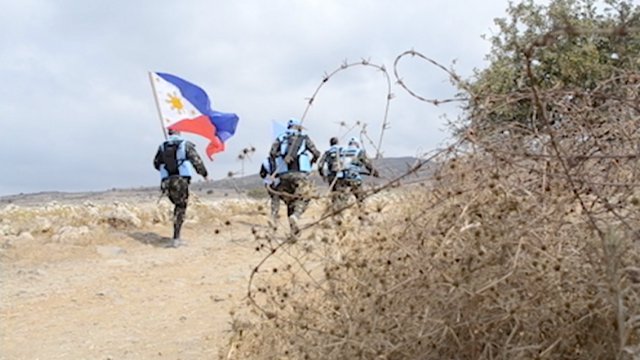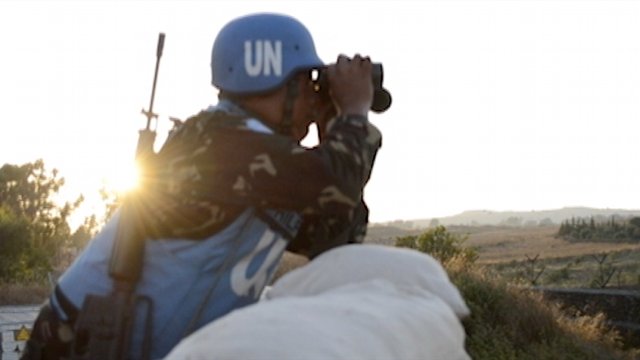SUMMARY
This is AI generated summarization, which may have errors. For context, always refer to the full article.

MANILA, Philippines – When news broke out Wednesday that 21 Filipino peacekeepers who are part of the UN Disengagement Observer Force (UNDOF) in the Golan Heights were kidnapped by Syrian rebels, Army Capt. Frank Sayson instinctively concluded that the kidnappers were not from that mountainous region.
Most likely, the kidnappers are not familiar with the Filipinos, or have not interacted with them, and see the peacekeeping soldiers only as a bargaining chip in their struggle.
Sayson recently returned from a peacekeeping mission in the Golan Heights, part of the 4th Philippine contingent sent there that served from 2010-2011. At that time, the situation there has started to be volatile, with revolutionary protests and demonstrations spreading in the Arab world, including Syria. This is known as the Arab Spring.
“The security and safety threat has been rising but there is no actual danger in the Golan Heights for our peacekeepers,” Sayson said. “The Filipino peacekeepers are known to be friendly, accommodating, approachable and likeable.”
In villages within the Area of Limitation in the Golan Heights, Filipino soldiers are warmly welcomed and accommodated by villagers because of their friendly demeanor and genuine service. This has been a trait of Filipino peacekeepers in other mission areas, which make them popular and loved by the locals.
Retired Major General Natalio Ecarma III, former Force Commander and Head of Mission in UNDOF, said that during his term, said they were able to win the hearts of the locals when he allowed villagers access to medical treatment. Before this, UN doctors only treat sick UN personnel and peacekeepers.
“When they (UN doctors) told me they cannot do that because that is not part of our mandate, I argued they are doctors and it is their duty to give attention to the sick. When they said there is no fund for that, I sought for fund and got it,” Ecarma said.
This extra attention and care endeared Ecarma and the Filipino peacekeepers to the villagers. They would engage Filipino soldiers to friendly and idle chat and it came to a point that some of them are able to speak a sprinkling of Filipino words.

Renegades from elsewhere
The Philippines has been participating in UN peacekeeping mission since 193 but this only went full blast in 1999 when the country sent a contingent in East Timor. So far, the country has sent missions in conflict areas like Kosovo, Liberia, Nepal, Haiti and the Golan Heights. This is part of the Philippines’ commitment to assist the UN in enforcing peace in conflict areas.
The Golan Heights–a mountainous region sandwiched by Syria and Israel–is one of the most coveted international peacekeeping operations by Filipino participants. Unlike in other mission areas, the facilities in Golan Heights have been above UN standards. This is because peacekeeping missions there had been in place since 1974 and all the birth pains that usually accompany a new mission area have been addressed.
In East Timor for instance, when the first Filipino contingent arrived there, they stayed in makeshift quarters with malaria-carrying mosquitoes as night time company. Filipinos who participated there recalled subsisting on canned sardines for weeks.
In the Golan Heights however, food, facilities and accommodation were no problem. With less to worry about, this mission area has been on top of the list of those who wish to be part of the peacekeeping effort.
As news filtered that 21 Filipino peacekeepers have been held against their will by Syrian rebels and efforts for their release bogged down, Sayson remained confident that they would not be harmed. Sayson was banking on the goodwill that Filipino peacekeepers are able to cultivate with Syrian as well as Israeli locals.
Ecarma said there had been isolated individual kidnappings of foreign peacekeepers in the past but they were eventually released unharmed. But the kidnapping of 21 Filipino soldiers was the first one that caught international attention because of their sheer number.
On Saturday, the Syrian rebels finally released the peacekeepers after 4 days of captivity. Earlier efforts to pick up the hostages have been stalled by shelling of Syrian forces.
With the situation now defused, families of the soldiers can now heave a sigh of relief. Like its fragile peace situation, the Golan Heights could be unpredictable. “At a flick of a finger, things could change,” he said.

Manna from heaven
There are about 330 Filipino peacekeeping forces in the Golan Heights. The same number, more or less, is deployed in other missions. The soldiers are the country’s unofficial ambassadors of peace, a source of pride despite the internal troubles back home.
Soldiers who participated in previous peacekeeping missions said Filipinos are well liked by other foreign soldiers because of their good-natured amiable personality. “We also are quick to adapt, easy to make friends with, patient, quick to learn and highly-skilled. We make things happen despite the limitations,” Sayson said.
Perhaps accustomed to internal conflicts, the Filipino soldiers are known for their bravery that other foreign peacekeepers could not help but envy. What the foreign soldiers do not know is that it is actually safer in peacekeeping missions than in conflict zones in the Philippines, Ecarma said.
For these soldiers, what has been the price to serve as peace ambassadors?
A Filipino peacekeeper receives a remuneration of $900 a month, plus a $10 a day. Typically, one battalion is assigned for 6 months in one mission. A new batch replaces them after this rotation.
For a low-ranked soldier who receives a monthly gross pay of P20,000, being tapped as a peacekeeper for 6 months is like manna from heaven. It enables them to save, since they continue to get their monthly salary at home.
This is why being included in the peacekeeping contingent is on top of the wish list of many soldiers.
It also allows them a respite from the weariness of battling insurgents at the home front. The experience of being exposed with other foreign soldiers, sharing knowledge and know-how, also proved to be beneficial for Filipino soldiers.
But there are downsides. Being away from their family is one. But it is one sacrifice that a soldier has to make, Sayson said. For a soldier, it is an opportunity to make an extra income and make their family better off, if only for a moment. – Rappler.com
Add a comment
How does this make you feel?
There are no comments yet. Add your comment to start the conversation.